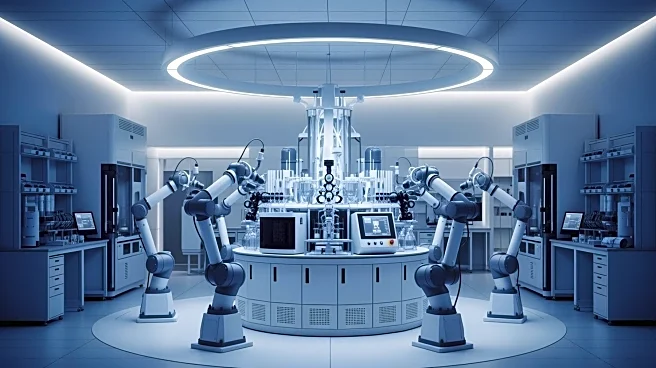What's Happening?
Syngene International, a contract research and development manufacturing organization (CRDMO) based in India, has announced significant upgrades to its facilities aimed at accelerating drug discovery and development.
The company has invested in a dedicated peptide laboratory located in Bengaluru, alongside advanced automation technologies integrated into its Drug Metabolism and Pharmacokinetics (DMPK) and Direct-to-Biology (D2B) workflows in Hyderabad. The new peptide laboratory is equipped to produce various molecules, including linear peptides, cyclic peptides, and peptide-drug conjugates, with synthesis scale-up capabilities reaching 800 mmol. The facility features six automated peptide synthesizers with robotic arms, which are expected to reduce project timelines significantly while ensuring consistent results. Additionally, the automation in DMPK operations includes robotic systems for high-throughput sample preparation, reducing turnaround times and improving cost efficiency.
Why It's Important?
The investments by Syngene International are poised to enhance the scalability, cost-efficiency, and data quality of drug discovery processes, which are crucial for therapeutic innovation. By integrating advanced automation technologies, the company aims to improve operational efficiency and accelerate scientific discovery. This development is significant for the pharmaceutical industry, as it could lead to faster and more cost-effective drug development, benefiting both the company and its clients. The establishment of the peptide laboratory is particularly important as peptides play a vital role in therapeutic development, offering potential advancements in treatment options. The automation-driven transformation in DMPK operations further underscores the company's commitment to innovation, potentially setting new standards in the industry.
What's Next?
Syngene International's strategic investments are expected to bolster its capabilities in supporting partners with end-to-end solutions, from synthesis and purification to characterization and early-stage development. The company plans to continue integrating automation with scientific expertise to create a robust platform for therapeutic innovation. As the pharmaceutical industry increasingly relies on peptides for drug development, Syngene's new facility positions it to meet growing demand and deliver greater value to its clients. The advancements may also prompt other companies in the sector to adopt similar technologies, potentially leading to broader industry shifts towards automation and efficiency.
Beyond the Headlines
The integration of advanced automation technologies in drug discovery processes raises important considerations regarding the future of pharmaceutical research and development. As automation becomes more prevalent, there may be ethical and workforce implications, such as the need for reskilling employees and addressing concerns about job displacement. Additionally, the focus on peptides highlights the evolving landscape of therapeutic development, where specialized facilities and expertise are increasingly necessary to meet complex scientific challenges. These developments could influence regulatory frameworks and industry standards, shaping the future of drug discovery and manufacturing.









